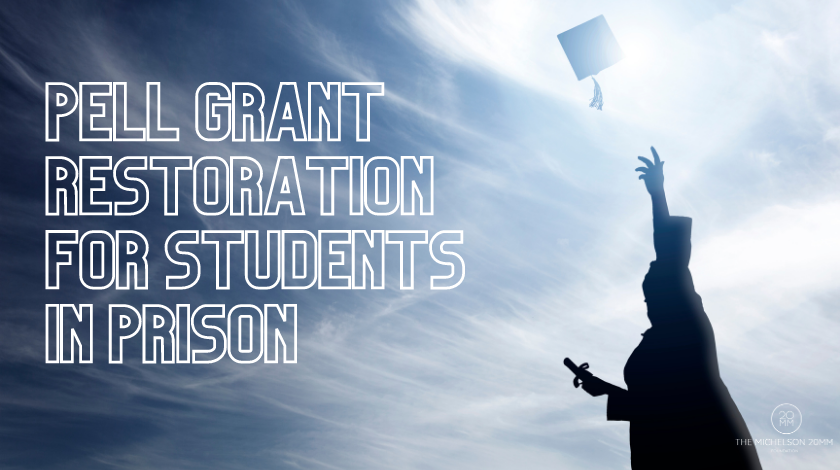Since 1994, federal Pell grants have been withheld from nearly 1.5 million incarcerated individuals in state and federal prisons–that is, until recently.
On December 20, 2020, Congress passed a sweeping package of bipartisan higher education equity measures, including a bill designed to provide meaningful help to marginalized students, students of color, and the schools that serve them. Tucked into this voluminous $1.4 trillion spending bill is Pell grant restoration for students in prison, which has been a key focus area for champions in smart justice, including two Michelson 20MM Spark Grantees: the Vera Institute of Justice and RAND Corporation.
By restoring Pell grant eligibility for students in prison, Vera estimates half a million additional students will qualify for federal funds unavailable to them for the past 26 years. Two decades of research concludes that higher education in prison programming reduces recidivism, results in taxpayer savings, increases community safety, and advances economic prosperity through workforce readiness upon release. Higher education in prison puts individuals on a path towards a brighter future by disrupting the cycle of poverty and incarceration. RAND Corporation found incarcerated individuals who participate in educational programs while in prison lessen their odds of recidivism by 43%.
December 20th’s victory is largely due to the success of and bipartisan support for the Second Chance Pell Experimental Sites, a pilot program launched under the Obama Administration. To date, 130 schools across 42 states offer Second Chance Pell programs, which have awarded more than 4,500 degrees. Part of the pilot program’s positive outcomes is due to rigorous implementation standards ensuring quality programs are offered that set students up for success. More than 180 schools applied to be a part of the second cohort of Second Chance Pell, only 67 were “determined to be the most qualified; their selection ensures institutional, programmatic, and geographic diversity among new participants,” according to the U.S. Department of Education.
While reinstating Pell grants is a tremendous win for society, those involved in the smart justice space, such as the Bard Prison Initiative (BPI), also caution us to ensure the quality of programs offered do not lessen. Max Kenner, BPI’s Executive Director, stated, “Pell won’t restore college in every prison, nor will it make college-in-prison everything it needs to be. There will be colleges that rush substandard programs into the field, taking advantage of the easy funding. There will be the need for philanthropic, local, and state investment.”
As we celebrate this long overdue smart justice victory, we hope you will join us and our partners as we continue to advance innovative pathways to educational attainment, employment, and economic opportunity for system-impacted communities and people.
The Michelson 20MM Foundation is dedicated to supporting and investing in leading organizations, technologies, and initiatives that seek to transform learning and improve access to educational opportunities that lead to a meaningful career. Michelson 20MM was founded thanks to the generous support of renowned spinal surgeon and inventor Dr. Gary K. Michelson and his wife, Alya Michelson. Visit us at 20mm.org.
